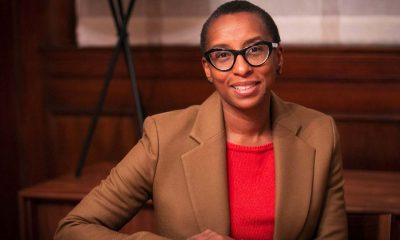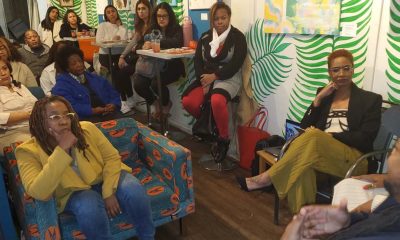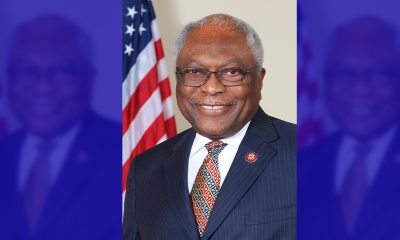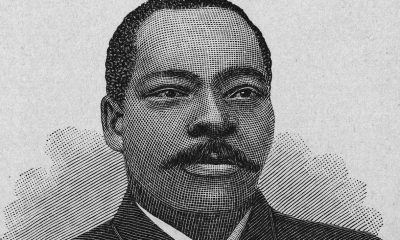National
Teachers with Subconscious Bias Punish Blacks More Severely

“We discovered, the more likely teachers thought a student was Black, the more harshly they wanted to punish them,” said Jason Okonofua, a doctoral student at Stanford University and co-author of the study, “Two Strikes: Race and the Disciplining of Young Students.” (Courtesy Photo)
By Jazelle Hunt
NNPA Washington Correspondent
WASHINGTON (NNPA) – When teachers harbor subconscious racial bias, they are far more likely to discipline White students less severely than African Americans, according to a new study.
As early as kindergarten, Black girls are being suspended at six times the rate of White girls, and more than all boys except fellow African Americans. Black boys are being suspended at three times the rate of White boys. According to 2010 figures from the Department’s Civil Rights Data Collection, 44 percent of those suspended more than once that year, and 36 percent of those expelled were Black – despite being less than 20 percent of the student population.
“Stereotypes serve as sort of a glue that sticks separate encounters together in our mind and lead us to then respond more negatively,” says Jason Okonofua, doctoral student at Stanford University and co-author of the study, “Two Strikes: Race and the Disciplining of Young Students.”
“In the study we have…the stereotype that the student is a ‘troublemaker’ leads the teacher to see two separate instances of misbehavior as constituting a pattern. Therefore following the second misbehavior there’s a sharp escalation in how severely the teacher wants to discipline a Black child.”
This is known as the “Black escalation effect.” As the number of behavioral issues increases, it is perceived as more of a threat to the classroom if the doer is Black. Black escalation leads teachers to discipline Black students faster and more harshly than their White counterparts, even when the students have the same number and types of offenses.
In the study, which appears in the April issue of Psychological Science, 53 teachers, all women, mostly White, were given a school record for a hypothetical student. Each record detailed two minor misbehaviors (classroom disruption and insubordination) – some for a hypothetical child named Darnell or Deshawn, others for a hypothetical child named Jake or Greg.
On average, teachers responded the same way to Darnell, Deshawn, Greg, and Jake on their first misbehaviors. But on the second offense, they were more likely to punish the boys they perceived as Black, more likely to issue harsher punishments to them, and more likely to label them “troublemakers.”
All of the participants were current K-12 teachers with an average of 14 years of experience.
“We discovered, the more likely teachers thought a student was Black, the more harshly they wanted to punish them,” Okonofua says. “That’s surprising because all we manipulated in the study was the names. But it’s not just the student’s name, it’s the level of Blackness teachers think the student is.”
The teachers in the study also reported feeling “more troubled” over second offenses when they perceived the student as Black (also by their own report). Further, when the students were perceived as Black, the teachers were more likely to report that they could see themselves suspending him in the future.
Stereotypes largely drive the Black escalation effect. Black children are more likely to be stereotyped as aggressive, defiant, and learning-disabled; when Black children misbehave and are disciplined, these stereotypes can kick in and result in harsher reactions.
Okonofua says, “Most school teachers work hard at treating their students equally. And yet, even among these well-intentioned and hardworking people, we find that cultural stereotypes about Black people are bending people’s perceptions toward less favorable interpretations of Black students’ behavior.”
The Department of Education estimates that 2014 was the first year students of color and White students reached equal numbers in the nation’s elementary and middle schools. Among kids under 5 years old, children of color are already the majority.
Most teacher training programs are not equipped to prepare future teachers for the realities of multiracial classrooms. But some programs have begun to recognize the impact this has on educational outcomes for the nation’s students of color.
“Part of the challenge of this is, for racial bias to even be brought to the table it requires a certain level of racial consciousness on the part of the teacher educator,” said Tyrone Howard, professor of education at University of California, Los Angeles.
“Ninety percent of all teacher educators are White. And by and large, most White people don’t think about issues of race.”
In addition to training teachers, Howard serves as the founding director of UCLA’s Black Male Institute to improve educational outcomes for Black boys, as well as the faculty director of UCLA Center X, a program that cultivates social justice-minded teachers for low-income Los Angeles public schools.
In his experience, White aspiring teachers tend to be uncomfortable or annoyed when he brings racism, stereotypes, and bias into his instruction. Meanwhile, he says, aspiring teachers of color often feel marginalized and unprepared for classrooms when their training programs avoid discussions on race.
“When I was in the Midwest, where the majority of my [education] students were White, there’s oftentimes a reticence to engage in that work while they’re in the program,” he says, adding that he was often told he made White people uncomfortable. “But once they’ve had the opportunity to understand that race is ever-present and that students of color are always watchful of what they say, what they do, and how they act…then [teachers] begin to see ‘Wow, I didn’t realize these issues were real.’”
Another challenge is that few programs have a system in place to verify whether their anti-bias training is effective once education students enter real classrooms.
But such programs are the exception. Most teachers receive little to no discussion or training on these issues – and in most states, this has no bearing on the requirements for earning teaching credentials.
For teachers who lack access to adequate anti-bias, anti-racist training, Okonofua has found through other research that refocusing on maintaining warm relationships with each student weakens the effect of subconscious biases.
Howard believes that without formal interventions, the effort to make teachers more culturally competent and will be too little, too late.
He says: “As long as states and credentialing commissions don’t make this a staple of what is required for credentials, it will always be looked at as optional or it will always be on the fringes.”
###
Activism
Oakland Post: Week of April 17 – 23, 2024
The printed Weekly Edition of the Oakland Post: Week of April 17 – 23, 2024

To enlarge your view of this issue, use the slider, magnifying glass icon or full page icon in the lower right corner of the browser window. ![]()
Barbara Lee
Congresswoman Barbara Lee Issues Statement on Deaths of Humanitarian Aid Volunteers in Gaza
On April 2, a day after an Israeli airstrike erroneously killed seven employees of World Central Kitchen (WCK), a humanitarian organization delivering aid in the Gaza Strip, a statement was release by Rep. Barbara Lee (D-CA-12). “This is a devastating and avoidable tragedy. My prayers go to the families and loved ones of the selfless members of the World Central Kitchen team whose lives were lost,” said Lee.

By California Black Media
On April 2, a day after an Israeli airstrike erroneously killed seven employees of World Central Kitchen (WCK), a humanitarian organization delivering aid in the Gaza Strip, a statement was release by Rep. Barbara Lee (D-CA-12).
“This is a devastating and avoidable tragedy. My prayers go to the families and loved ones of the selfless members of the World Central Kitchen team whose lives were lost,” said Lee.
The same day, it was confirmed by the organization that the humanitarian aid volunteers were killed in a strike carried out by Israel Defense Forces (IDF). Prior to the incident, members of the team had been travelling in two armored vehicles marked with the WCF logo and they had been coordinating their movements with the IDF. The group had successfully delivered 10 tons of humanitarian food in a deconflicted zone when its convoy was struck.
“This is not only an attack against WCK. This is an attack on humanitarian organizations showing up in the direst situations where food is being used as a weapon of war. This is unforgivable,” said Erin Gore, chief executive officer of World Central Kitchen.
The seven victims included a U.S. citizen as well as others from Australia, Poland, the United Kingdom, Canada, and Palestine.
Lee has been a vocal advocate for a ceasefire in Gaza and has supported actions by President Joe Biden to airdrop humanitarian aid in the area.
“Far too many civilians have lost their lives as a result of Benjamin Netanyahu’s reprehensible military offensive. The U.S. must join with our allies and demand an immediate, permanent ceasefire – it’s long overdue,” Lee said.
Commentary
Commentary: Republican Votes Are Threatening American Democracy
In many ways, it was great that the Iowa Caucuses were on the same day as Martin Luther King Jr. Day. We needed to know the blunt truth. The takeaway message after the Iowa Caucuses where Donald Trump finished more than 30 points in front of Florida Gov. De Santis and former South Carolina Governor Nikki Haley boils down to this: Our democracy is threatened, for real.

By Emil Guillermo
In many ways, it was great that the Iowa Caucuses were on the same day as Martin Luther King Jr. Day.
We needed to know the blunt truth.
The takeaway message after the Iowa Caucuses where Donald Trump finished more than 30 points in front of Florida Gov. De Santis and former South Carolina Governor Nikki Haley boils down to this: Our democracy is threatened, for real.
And to save it will require all hands on deck.
It was strange for Iowans to caucus on MLK day. It had a self-cancelling effect. The day that honored America’s civil rights and anti-discrimination hero was negated by evening.
That’s when one of the least diverse states in the nation let the world know that white Americans absolutely love Donald Trump. No ifs, ands or buts.
No man is above the law? To the majority of his supporters, it seems Trump is.
It’s an anti-democracy loyalty that has spread like a political virus.
No matter what he does, Trump’s their guy. Trump received 51% of caucus-goers votes to beat Florida Gov. Ron DeSantis, who garnered 21.2%, and former South Carolina Gov. Nikki Haley, who got 19.1%.
The Asian flash in the pan Vivek Ramaswamy finished way behind and dropped out. Perhaps to get in the VP line. Don’t count on it.
According to CNN’s entrance polls, when caucus-goers were asked if they were a part of the “MAGA movement,” nearly half — 46% — said yes. More revealing: “Do you think Biden legitimately won in 2020?”
Only 29% said “yes.”
That means an overwhelming 66% said “no,” thus showing the deep roots in Iowa of the “Big Lie,” the belief in a falsehood that Trump was a victim of election theft.
Even more revealing and posing a direct threat to our democracy was the question of whether Trump was fit for the presidency, even if convicted of a crime.
Sixty-five percent said “yes.”
Who says that about anyone of color indicted on 91 criminal felony counts?
Would a BIPOC executive found liable for business fraud in civil court be given a pass?
How about a BIPOC person found liable for sexual assault?
Iowans have debased the phrase, “no man is above the law.” It’s a mindset that would vote in an American dictatorship.
Compare Iowa with voters in Asia last weekend. Taiwan rejected threats from authoritarian Beijing and elected pro-democracy Taiwanese vice president Lai Ching-te as its new president.
Meanwhile, in our country, which supposedly knows a thing or two about democracy, the Iowa caucuses show how Americans feel about authoritarianism.
Some Americans actually like it even more than the Constitution allows.
About the Author
Emil Guillermo is a journalist and commentator. He does a mini-talk show on YouTube.com/@emilamok1.
-

 Activism4 weeks ago
Activism4 weeks agoOakland Post: Week of March 27 – April 2, 2024
-

 #NNPA BlackPress4 weeks ago
#NNPA BlackPress4 weeks agoCOMMENTARY: D.C. Crime Bill Fails to Address Root Causes of Violence and Incarceration
-

 #NNPA BlackPress4 weeks ago
#NNPA BlackPress4 weeks agoFrom Raids to Revelations: The Dark Turn in Sean ‘Diddy’ Combs’ Saga
-

 #NNPA BlackPress4 weeks ago
#NNPA BlackPress4 weeks agoCOMMENTARY: Lady Day and The Lights!
-

 #NNPA BlackPress4 weeks ago
#NNPA BlackPress4 weeks agoMayor, City Council President React to May 31 Closing of Birmingham-Southern College
-

 #NNPA BlackPress4 weeks ago
#NNPA BlackPress4 weeks agoBaltimore Key Bridge Catastrophe: A City’s Heartbreak and a Nation’s Alarm
-

 #NNPA BlackPress4 weeks ago
#NNPA BlackPress4 weeks agoBaltimore’s Key Bridge Struck by Ship, Collapses into Water
-

 #NNPA BlackPress4 weeks ago
#NNPA BlackPress4 weeks agoBeloved Actor and Activist Louis Cameron Gossett Jr. Dies at 87





















































